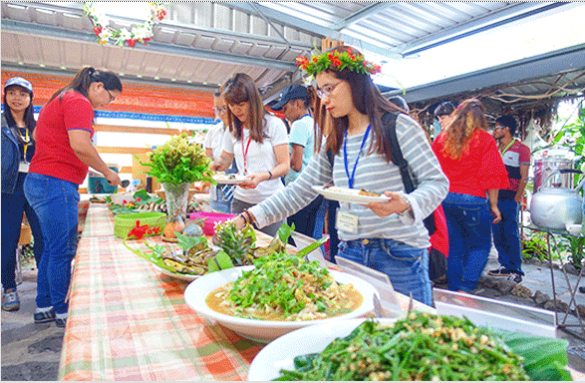NPUST’s Department of Forestry director, Dr. Meihui Chen, has been working in Taiwan’s tribal areas for many years, and on May 11th, she led a group of NPUST’s international students on a trip to Wutai to take part in a Rukai Tribe cultural class and experience some of Taiwan’s aboriginal cultural heritage.Nineteen students coming from 10 countries made the trip up the mountains to the place the Rukai Tribe calls home. Several young tribe members provided lectures, and the visitors were taught how to make head garlands by hand. The students where then led on a guided tour through the village, and learned about tribal history, the local church and the story of Limuasha. They also had a chance to try a variety of traditional dishes and locally produced food products including “cinavu” (pork mixed with taro powder and wrapped in tender Khaya Trichodesma leaves), boiled taro, and forest-raised chicken and eggs – produced using “under forest” economic practices.Professor Meihui noted that following the devastating typhoon Morakot, ecological tourism was adopted by the tribe’s people in the area to help fund the recovery, and in 2014 they started incorporating under-forest economic concepts.Although the disaster brought on by Morakot was severe, the tribe’s people maintained a love for their home and for the traditional Rukai culture. The guide explained that it was professor Meihui Chen who worked with the tribes to develop the ecological tourism and under-forest economics strategies with the aim of developing a system of self-sufficiency.Truong Thi Trang Nhu, a Vietnamese national studying her PHD at the NPUST Graduate Institute of Animal Vaccine Technology said that “ecological tourism and under forest economies are currently popular topics in Vietnam. We hope that by experiencing this ecotourism, which is integrated with Taiwan’s aboriginal culture, that some sort of spark will be ignited”.Another student, Kavan Rai Manavalike from India, pointed out that “India’s earliest civilizations began in the forests. People universally believe that planting and maintaining trees is admirable behavior. Aryan civilization and Hinduism both strongly emphasize that humanity and nature should be in harmony. That is why I wanted to see the Taiwan aboriginal culture and the way in which they interact harmoniously with the forest”.The classes held by the Rukai Tribe gave the international students an opportunity to experience some of Taiwan’s aboriginal culture and increased their understandings of ecological tourism and Satoyama economic principles. The trip gave the students a chance to identify with the local area and hopefully they will be able to take some of what they learned back home with them once they have finished their schooling at NPUST.

